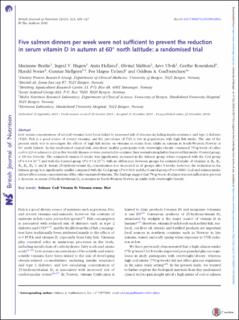| dc.contributor.author | Bratlie, Marianne | |
| dc.contributor.author | Hagen, Ingrid Valheim | |
| dc.contributor.author | Helland, Anita | |
| dc.contributor.author | Midttun, Øivind | |
| dc.contributor.author | Ulvik, Arve | |
| dc.contributor.author | Rosenlund, Grethe | |
| dc.contributor.author | Sveier, Harald | |
| dc.contributor.author | Mellgren, Gunnar | |
| dc.contributor.author | Ueland, Per Magne | |
| dc.contributor.author | Gudbrandsen, Oddrun Anita | |
| dc.date.accessioned | 2021-05-05T11:32:29Z | |
| dc.date.available | 2021-05-05T11:32:29Z | |
| dc.date.created | 2020-09-21T22:12:45Z | |
| dc.date.issued | 2020 | |
| dc.Published | British Journal of Nutrition. 2020, 123 (4), 419-427. | |
| dc.identifier.issn | 0007-1145 | |
| dc.identifier.uri | https://hdl.handle.net/11250/2753683 | |
| dc.description.abstract | Low serum concentrations of several vitamins have been linked to increased risk of diseases including insulin resistance and type 2 diabetes (T2D). Fish is a good source of several vitamins, and the prevalence of T2D is low in populations with high fish intake. The aim of the present study was to investigate the effects of high fish intake on vitamins in serum from adults in autumn in South-Western Norway at 60° north latitude. In this randomised clinical trial, sixty-three healthy participants with overweight/obesity consumed 750 g/week of either cod (n 22) or salmon (n 22) as five weekly dinners or were instructed to continue their normal eating habits but avoid fish intake (Control group, n 19) for 8 weeks. The estimated vitamin D intake was significantly increased in the Salmon group when compared with the Cod group (P = 6·3 × 10−4) and with the Control group (P = 3·5 × 10−6), with no differences between groups for estimated intake of vitamins A, B1, B2, B3, B6, B9, C and E. Serum 25-hydroxyvitamin D3 concentration was decreased in all groups after 8 weeks; however, the reduction in the Salmon group was significantly smaller compared with the Cod group (P = 0·013) and the Control group (P = 0·0060). Cod and salmon intake did not affect serum concentrations of the other measured vitamins. The findings suggest that 750 g/week of salmon was not sufficient to prevent a decrease in serum 25-hydroxyvitamin D3 in autumn in South-Western Norway in adults with overweight/obesity. | en_US |
| dc.language.iso | eng | en_US |
| dc.publisher | Cambridge University Press | en_US |
| dc.title | Five salmon dinners per week were not sufficient to prevent the reduction in serum vitamin D in autumn at 60° north latitude: A randomised trial | en_US |
| dc.type | Journal article | en_US |
| dc.type | Peer reviewed | en_US |
| dc.description.version | publishedVersion | en_US |
| dc.rights.holder | Copyright The Authors 2019 | en_US |
| cristin.ispublished | true | |
| cristin.fulltext | original | |
| cristin.qualitycode | 1 | |
| dc.identifier.doi | 10.1017/S0007114519002964 | |
| dc.identifier.cristin | 1831922 | |
| dc.source.journal | British Journal of Nutrition | en_US |
| dc.source.40 | 123 | |
| dc.source.14 | 4 | |
| dc.source.pagenumber | 419-427 | en_US |
| dc.identifier.citation | British Journal of Nutrition. 2020, 123(4), 419–427 | en_US |
| dc.source.volume | 123 | en_US |
| dc.source.issue | 4 | en_US |
